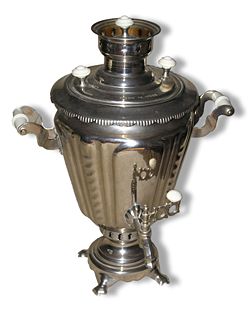самовар
Bulgarian
Etymology
Borrowed from Russian самова́р (samovár, literally “self-boiler”); from само́ (samó, “self”) + вари́ть (varítʹ, “to boil”, “to cook”).
Pronunciation
Noun
самова́р • (samovár) m
Declension
| singular | plural | |
|---|---|---|
| indefinite | самова́р samovár |
самова́ри samovári |
| definite (subject form) |
самова́рят samovárjat |
самова́рите samovárite |
| definite (object form) |
самова́ря samovárja | |
| count form | — | самова́ря samovárja |
Anagrams
- варосам (varosam)
Macedonian
Etymology
Borrowed from Russian самова́р (samovár, literally “self-boiler”), from само́ (samó, “self”) + вари́ть (varítʹ, “to boil, to cook”).
Pronunciation
Noun
самовар • (samovar) m
Russian

Etymology 1
From само- (samo-, “self-”) + a deverbal form of вари́ть (varítʹ, “to boil”).
Pronunciation
Noun
самова́р • (samovár) m inan (genitive самова́ра, nominative plural самова́ры, genitive plural самова́ров, relational adjective самова́рный, diminutive самова́рчик)
- samovar (a large coal- or woodfired metal urn with a spigot for boiling water for tea)
- 1842, Николай Гоголь , “Том I, Глава 1”, in Мёртвые души; English translation from Constance Garnett, transl., Dead Souls, London: Chatto & Windus, 1922:
- В уго́льной из э́тих ла́вочек, и́ли, лу́чше, в окне́, помеща́лся сби́тенщик с самова́ром из кра́сной ме́ди и лицо́м так же кра́сным, как самова́р, так что и́здали мо́жно бы поду́мать, что на окне́ стоя́ло два самова́ра, е́сли б оди́н самова́р не был с чёрною как смоль бородо́ю.
- V ugólʹnoj iz étix lávoček, íli, lúčše, v okné, pomeščálsja sbítenščik s samovárom iz krásnoj médi i licóm tak že krásnym, kak samovár, tak što ízdali móžno by podúmatʹ, što na okné stojálo dva samovára, jésli b odín samovár ne byl s čórnoju kak smolʹ borodóju.
- In the corner one of these shops, or rather in the window of it, there was a man who sold hot spiced drinks, with a samovar of red copper and a face as red as his samovar, so that from a distance one might have imagined that there were two samovars in the window, if one of them had not had a beard as black as pitch.
Declension
| singular | plural | |
|---|---|---|
| nominative | самова́р samovár |
самова́ры samováry |
| genitive | самова́ра samovára |
самова́ров samovárov |
| dative | самова́ру samováru |
самова́рам samováram |
| accusative | самова́р samovár |
самова́ры samováry |
| instrumental | самова́ром samovárom |
самова́рами samovárami |
| prepositional | самова́ре samováre |
самова́рах samovárax |
Derived terms
- самова́ришко m (samováriško)
- е́здить в Ту́лу со свои́м самова́ром (jézditʹ v Túlu so svoím samovárom)
Descendants
- → Armenian: սամովար (samovar)
- → Azerbaijani: samovar
- → Bashkir: самауыр (samawır)
- → Bulgarian: самова́р (samovár)
- Chinese:
- → Danish: samovar
- → English: samovar
- → Georgian: სამოვარი (samovari)
- → Greek: σαμοβάρι (samovári)
- → Japanese: サモワール (samowāru)
- → Kazakh: самауыр (samauyr)
- → Korean: 사모바르 (samobareu)
- → Kumyk: сумавар (sumawar)
- → Northern Kurdish: semawer
- → Kyrgyz: самоор (samoor)
- → Macedonian: самовар (samovar)
- → Mingrelian: სამვარი (samvari)
- → Persian: سماور (samâvar)
- → Polish: samowar
- Sami:
- Serbo-Croatian:
- → Slovak: samovar
- → Svan: სამვა̈რ (samvär)
- → Turkish: semaver
- → Turkmen: semawar
- → Uyghur: ساماۋار (samawar)
- → Uzbek: samovar
- → Yakut: сылабаар (sılabaar)
Etymology 2
Noun
самова́р • (samovár) m inan (genitive самова́ра, nominative plural самова́ры, genitive plural самова́ров)
- A person without legs or hands; a basket case.
- 2011 September 1, Александр Добровольский, “«Самовары» товарища Сталина”, in Moskovskij Komsomolets, retrieved 2023-08-25:
- «Самоварами» цинично, но очень точно называли в послевоенной стране тяжело изувеченных взрывами и осколками людей — инвалидов, у которых не было ни рук, ни ног. Судьба этих «обрубков войны» до сих пор остается «за кадром», а многие из них так и числятся без вести пропавшими.
- «Samovarami» cinično, no očenʹ točno nazyvali v poslevojennoj strane tjaželo izuvečennyx vzryvami i oskolkami ljudej — invalidov, u kotoryx ne bylo ni ruk, ni nog. Sudʹba etix «obrubkov vojny» do six por ostajetsja «za kadrom», a mnogije iz nix tak i čisljatsja bez vesti propavšimi.
- (please add an English translation of this quotation)
- 2020 June 22, Изольда Дробина, “«Самовары» России”, in Novaya Gazeta, retrieved 2023-08-25:
- По словам Алексея Зыкова, чаще всего инвалидов можно было встретить возле продуктовых магазинов. В тамбур заходишь, там обязательно «самовар» сидит, без рук и ног. Его в самодельном кульке или «рюкзаке» приносила сердобольная женщина утром. Весь день инвалид там сидел, просил милостыню, вечером она его забирала.
- Po slovam Alekseja Zykova, čašče vsevo invalidov možno bylo vstretitʹ vozle produktovyx magazinov. V tambur zaxodišʹ, tam objazatelʹno «samovar» sidit, bez ruk i nog. Jevo v samodelʹnom kulʹke ili «rjukzake» prinosila serdobolʹnaja ženščina utrom. Vesʹ denʹ invalid tam sidel, prosil milostynju, večerom ona jevo zabirala.
- (please add an English translation of this quotation)
Serbo-Croatian
Etymology
Borrowed from Russian самова́р (samovár, literally “self-boiler”); from само́ (samó, “self”) + вари́ть (varítʹ, “to boil, cook”).
Pronunciation
Noun
са̏мова̄р m animacy unspecified (Latin spelling sȁmovār)
